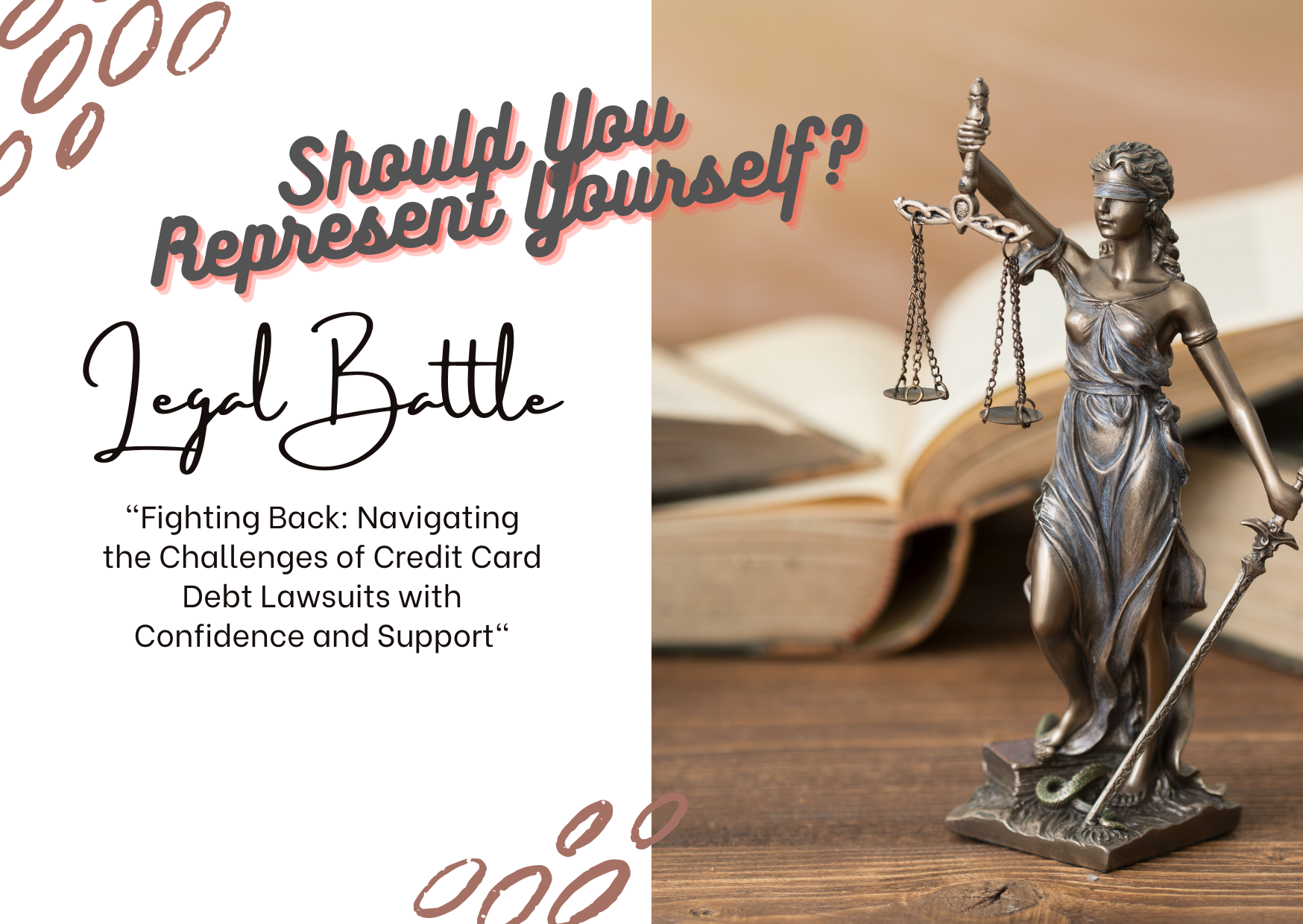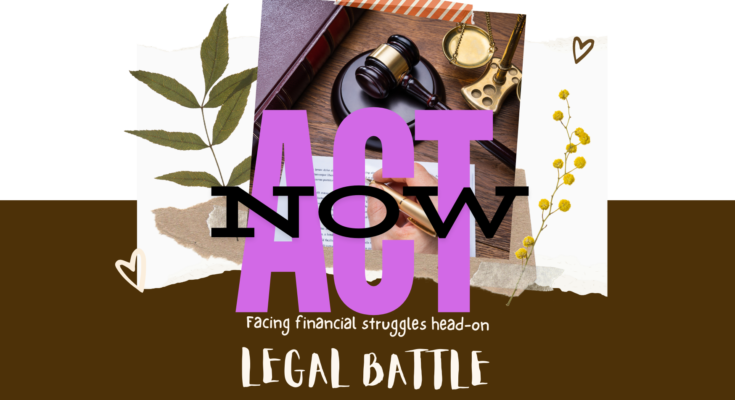If you’re dealing with a credit card lawsuit, understanding your rights is crucial, and acting swiftly is important. It’s vital to consult with a qualified professional.
This guide gathers pertinent information from reliable sources. It offers strategies and legal pointers for challenging your case. The guide covers responding tactics, defense preparation, settlement negotiation, and the decision between self-representation or engaging an attorney.
Following these steps may safeguard your finances against credit card debt lawsuits. Please be aware that this is not legal advice; rather, the aim is to gather pertinent information into a single resource for public access and to inform you about the processes and actions associated with such lawsuits.
Key Takeaways
- Understand the reasons for credit card lawsuits and the potential consequences of not responding
- Gather relevant documents and evidence to build a strong defense
- Learn about common legal defenses against credit card lawsuits
- Consider negotiating a settlement to avoid a court judgment
- Understand the pros and cons of representing yourself or hiring an attorney
Understanding Credit Card Lawsuits
It’s crucial for consumers to grasp the basics of credit card lawsuits and why creditors might sue. Knowing this can help you defend yourself if needed.
What Is a Credit Card Lawsuit?
A credit card lawsuit happens when a credit card company, bank, or debt collector sues a consumer who owes money. They want to get back what’s owed, including extra fees and interest, through court.
Reasons for Credit Card Lawsuits
Credit card companies often sue for several reasons:
- Nonpayment or Late Payments: Not paying the minimum or being way behind can lead to a lawsuit.
- Defaulted Accounts: If a card goes into default after missing payments, the company might sue to get back what’s owed.
- Fraudulent Activity: If a company thinks there’s fraud, like identity theft or unauthorized charges, they might sue to investigate and recover losses.
- Breach of Contract: If you break the rules set in your credit card agreement, the company could sue you for it.
Knowing why credit card lawsuits happen helps you prepare. By understanding these common reasons, you can tackle any issues with your accounts better.
| Reason for Credit Card Lawsuit | Explanation |
|---|---|
| Nonpayment or Late Payments | Not paying the minimum or being way behind can lead to a lawsuit. |
| Defaulted Accounts | Going into default after missing payments can result in a lawsuit to recover the debt. |
| Fraudulent Activity | Suspecting fraud, like identity theft or unauthorized charges, can lead to a lawsuit to investigate and recover losses. |
| Breach of Contract | Breaking the rules in your credit card agreement can lead to a lawsuit for breach of contract. |
Responding to a Credit Card Lawsuit
When you get a credit card lawsuit, act fast and know the deadlines and what could happen. If you don’t respond, you could lose by default. Here’s how to file an answer to the lawsuit correctly:
Deadlines and Consequences
Generally, you are given 20 to 30 days to submit a written response to a lawsuit. Failing to meet this deadline may lead to a default judgment being issued against you. Under these circumstances, the court might rule in favor of the credit card company without considering your side of the story.
A default judgment can have serious repercussions. It may result in wage garnishment, frozen bank accounts, and additional legal complications. It is crucial to adhere to deadlines to safeguard your rights.
Filing an Answer
When responding to a credit card lawsuit, it is crucial to thoroughly review the lawsuit documents and prepare a written response. This response must address each claim made by the credit card company and present your defense. Common elements of such a response include:
- Admitting or denying the specific allegations made in the lawsuit
- Raising any applicable defenses, such as the statute of limitations or disputes over the debt amount
- Requesting a jury trial, if desired
- Providing any counterclaims or set-offs against the credit card company
Ensure you file your response promptly and provide a copy to the lawyer representing the credit card company. Incorrect filing can complicate your defense.
Responding accurately and on time to a credit card lawsuit is crucial to safeguard your rights. Verify the deadlines, understand the requirements of a response, and submit it correctly.
Preparing Your Defense
Facing a credit card lawsuit requires a robust defense. Begin by gathering all relevant documents and evidence associated with your credit card and the related debt. This guide will assist you in identifying and organizing the necessary information for your defense.
Gathering Relevant Documents
Firstly, assemble and categorize the necessary documents for your defense. You should collect the following:
- Credit card statements for the relevant time period
- Evidence of payments, such as bank statements or canceled checks
- Any communication with the credit card company, including letters, emails, or phone call logs
- Copies of agreements or disclosures provided upon opening the credit card account
- Records of any disputes or errors reported to the credit card company
- Proof of any identity theft or unauthorized transactions on your account
These documents are crucial for understanding the history of your credit card account and for identifying any potential issues or defenses for the lawsuit.

Well-organized documents can significantly strengthen your defense. Dedicate time to meticulously review and arrange your records. This meticulous preparation will provide a robust foundation for your case.
| Document Type | Purpose |
|---|---|
| Credit card statements | Verify the accuracy of the alleged debt and any charges or payments made |
| Proof of payments | Demonstrate that you have made payments or that the debt has been partially or fully paid off |
| Correspondence with the credit card company | Provide evidence of any disputes, errors, or issues with the account |
| Account agreements and disclosures | Verify the terms and conditions of the credit card account |
| Evidence of identity theft or unauthorized charges | Establish that you are not responsible for the alleged debt |
By collecting these important documents, you’re on your way to a strong defense for the credit card lawsuit.
Common Defenses Against Credit Card Lawsuits
Facing a credit card lawsuit can feel overwhelming. But knowing the common legal defenses can help you win. These defenses can protect you from unfair debt collection and question the debt’s validity.
A key defense is the statute of limitations. This is the time limit the law sets for creditors to sue you. If they wait too long, they can’t sue you anymore. Another strong defense is improper service of process. This happens when the creditor doesn’t notify you correctly, breaking your right to fair process.
Lack of evidence is also a powerful defense. If the creditor can’t show the debt is real, the case might be thrown out. If the original creditor didn’t keep good records, that can also help you.
Other defenses include identity theft, proving the debt isn’t yours, and discharge in bankruptcy. If you’ve already been cleared of the debt through bankruptcy, this can be a strong argument.
| Defense | Explanation |
|---|---|
| Statute of Limitations | The time limit set by law for creditors to file a lawsuit |
| Improper Service of Process | The creditor failed to properly notify you of the lawsuit |
| Lack of Evidence | The creditor cannot provide adequate documentation to prove the debt is valid |
| Original Creditor’s Failure to Maintain Records | The creditor’s inability to provide proper records can undermine their claim |
| Identity Theft | You can prove the debt is not yours |
| Discharge in Bankruptcy | The debt was previously discharged through bankruptcy proceedings |
Knowing these common defenses can help you fight a credit card lawsuit effectively. It can increase your chances of winning in court. Remember, being informed is key in dealing with the legal issues of credit card lawsuits.
“The best defense is a good offense. Understanding your legal options is crucial when facing a credit card lawsuit.”
Negotiating a Settlement
When facing a credit card lawsuit, negotiating a settlement might be the best choice. This way, you could settle the debt on easier terms, avoiding court risks. But, successful negotiations need careful planning and a smart strategy.
Considering Settlement Options
There are a few settlement options to think about when talking to a credit card company. These include:
- Reduced lump-sum payment: The creditor might agree to a one-time, lower payment to settle the debt fully.
- Installment plan: Getting a more affordable monthly payment plan can make the debt easier to handle.
- Partial debt forgiveness: The creditor could forgive part of the debt if you pay the rest quickly.
Tips for Successful Negotiations
To improve your chances of getting a good settlement, follow these tips:
- Gather relevant documentation: Collect evidence like payment records or letters that support your case and help your negotiation.
- Be prepared to compromise: Aim for the best deal but be ready to make some compromises that still fit your budget.
- Communicate effectively: Talk calmly and clearly during negotiations, making your requests and answers straightforward.
- Get the agreement in writing: Make sure any settlement terms are written down and signed by both sides to prevent future disagreements.
Dealing with a credit card lawsuit settlement can be tricky, but with the right strategies and knowledge, you might get a better deal than in court.
Remember, the main thing is to have a clear plan, be open to compromise, and look for a solution that works for both sides. This way, you can address your financial issues.
Representing Yourself in Court
Choosing to represent yourself in a credit card lawsuit requires a solid understanding of courtroom rules. While it may appear daunting, proper preparation and a positive attitude can enable you to effectively assert your rights.
Courtroom Etiquette and Procedures
Acting professionally and respectfully in court is a must. Dress well, show respect to the judge and others, and follow the court’s rules.
- Dress professionally: Wear clean, neat, and conservative clothes to show you’re serious and credible.
- Address the court properly: Call the judge “Your Honor” and speak formally in court.
- Speak clearly and concisely: Make your points and show your evidence clearly and without rambling.
- Respect the court’s procedures: Listen to the judge, stick to time limits, and don’t disrupt the proceedings.
- Remain calm and composed: Keep your cool, even when things get tense or emotional.
Knowing how to act in a credit card lawsuit is crucial. Learn the courtroom rules and act accordingly to boost your chances of winning.
“The key to effectively representing yourself in court is preparation, professionalism, and a clear, focused presentation of your case.”

The courtroom is formal and structured. Following its rules is key for a fair hearing. Stick to courtroom etiquette for credit card lawsuit to improve your chances of success in representing yourself in a credit card lawsuit.
credit card, lawsuit, court
Navigating credit card disputes can be complex. Understanding credit card lawsuits, court procedures, and potential outcomes is crucial. This section outlines the key aspects of legal battles between credit card companies and consumers.
A credit card lawsuit typically involves a dispute over unpaid debts and equitable treatment, with the court adjudicating these issues. Comprehending the court’s rules, the steps for filing, and the implications of a court’s decision is essential.
Creditors initiate lawsuits to recover owed money, including late fees and accrued interest. Consumers may counter these actions to protect their credit ratings and finances. While facing court proceedings can be daunting, being equipped with the right defense strategies can increase the chances of a favorable outcome.
The Legal Landscape of Credit Card Lawsuits
If a credit card company sues, a complex legal process starts. People need to know the deadlines to answer the lawsuit. Missing these can lead to serious problems like taking money from your paycheck or freezing your bank account.
Answering the lawsuit with a document called an “answer” is key. It lets you tell your side, defend yourself, and question the creditor’s claims. Make sure to look over the lawsuit papers and collect all important evidence for your case.
Navigating the Court Proceedings
In court, both sides share their arguments and evidence. It’s important to know how to act in court to speak up for yourself well. This might mean asking questions of witnesses, showing documents, and answering the judge’s questions clearly.
| Creditor’s Role | Consumer’s Role |
|---|---|
| Prove the existence and validity of the debt | Challenge the creditor’s claims and present a defense |
| Demonstrate compliance with legal requirements | Provide evidence and documentation to support their case |
| Seek a judgment in their favor | Negotiate a settlement or seek a dismissal of the lawsuit |
The outcome of a credit card lawsuit impacts both the creditor and the debtor. Understanding the court’s decision-making process and the subsequent actions is crucial in managing such legal matters.
Staying informed and proactive is beneficial in achieving a favorable result and safeguarding one’s finances in a credit card lawsuit.
Hiring an Attorney
When you’re facing a credit card lawsuit, think about the good and bad of hiring an experienced attorney. You could try to represent yourself, but having a lawyer can really boost your chances of winning.
Pros of Legal Representation
- Expertise in navigating the legal system: Attorneys know all about credit card lawsuits and can plan your case well.
- Stronger negotiating power: Lawyers use their skills and experience to get better deals or terms from the credit card company.
- Increased chances of success: People with lawyers often win their cases more often than those who go it alone.
- Familiarity with legal procedures: Attorneys know all about deadlines, what to file, and how to act in court, making sure your case goes smoothly.
Cons of Legal Representation
- Higher costs: Lawyers cost money, with fees that can be hundreds or even thousands of dollars, based on how complex your case is.
- Potential for delays: Cases with lawyers can take a long time, and lawyers might ask for more time, which can make things take longer.
- Loss of control: Hiring a lawyer may result in having less control over decisions, as they often make choices on your behalf.
Whether to hire an attorney for a credit card lawsuit depends on your situation, budget, and how comfortable you are with legal stuff. Think about the pros and cons of legal representation for a credit card lawsuit to decide what’s best for you.
Alternative Dispute Resolution

When you’re facing a credit card lawsuit, looking into mediation and arbitration can be smart. These methods are different from going to court. They might help you settle things faster and cheaper.
Mediation for Credit Card Lawsuits
Mediation means a neutral person helps the credit card company and you talk things out. Both sides share their views and try to find a common solution. It works well when you need to keep talking and understand each other’s sides.
Arbitration for Credit Card Lawsuits
Arbitration is a step up from mediation. An arbitrator listens to both sides and makes a final decision. It’s quicker and cheaper than going to court, making it a good choice for a fast solution.
The benefits of alternative dispute resolution for credit card lawsuits are:
- Greater control over the outcome
- Potential cost savings compared to litigation
- Preservation of ongoing relationships between the parties
- Increased privacy and confidentiality
Think about your case and the pros and cons of each method before choosing the best alternative dispute resolution option.
“Mediation and arbitration can be powerful tools in resolving credit card lawsuits, offering a more collaborative and cost-effective approach compared to traditional litigation.”
| Mediation | Arbitration |
|---|---|
| Collaborative process with a neutral mediator | Formal hearing with a binding decision by an arbitrator |
| Focuses on open communication and negotiation | Follows established arbitration rules and procedures |
| Potentially less expensive than court proceedings | Usually faster than traditional court cases |
| Maintains ongoing relationships between parties | Offers more privacy and confidentiality |
Dealing with a Judgment
If you lose a credit card lawsuit, getting a judgment against you can feel scary. But, you still have ways to deal with it. Knowing about the options after a judgment can help you lessen its effect on your money and find ways to move ahead.
Post-Judgment Options
When you face a credit card lawsuit judgment, you have a few things you can do:
- Appeal the Judgment: If you think the court made a mistake, you might be able to appeal. This means you file an appeal with a higher court and explain why the first decision was wrong.
- Negotiate a Payment Plan: You could talk to the creditor about paying in monthly bits instead of all at once. This might make it easier to manage.
- Seek Debt Negotiation: Sometimes, you can work out a deal with the creditor to pay less. This could be through a settlement or questioning the debt’s validity.
- Explore Bankruptcy: If the judgment is too much for you, bankruptcy might be an option. It can help clear or reorganize the debt.
The best way to handle a judgment depends on your situation, the lawsuit details, and your money matters. It’s key to look at each option carefully and maybe get advice from a lawyer.
| Post-Judgment Option | Potential Benefits | Potential Drawbacks |
|---|---|---|
| Appeal the Judgment | Chance to reverse the original decision if mistakes were made | Takes time and might need a lawyer, winning is not sure |
| Negotiate a Payment Plan | Allows for easier monthly payments, avoids big payment | Creditor might not agree, payment plan could still be hard |
| Seek Debt Negotiation | Could lower the debt you owe | Creditor might not negotiate, success is up to your negotiation skills |
| Explore Bankruptcy | Can clear or reorganize the debt, gives financial relief | Big effect on credit, long-term effects, complex legal process |
Every situation is different, so the best way to handle a credit card lawsuit judgment depends on you. Getting advice from a lawyer who knows what they’re doing can help you pick the right path.
“Facing a credit card lawsuit judgment can be overwhelming, but there are steps you can take to mitigate the impact and find a path forward. Exploring post-judgment options like appeals, payment plans, or debt negotiation can provide valuable opportunities to resolve the situation on more favorable terms.”
Rebuilding Your Credit
After winning a credit card lawsuit, you start the journey to fix your credit. This journey helps you get back on track, opens doors to new credit, and boosts your confidence. Let’s look at key steps and tips for rebuilding credit after a credit card lawsuit or credit repair after winning a credit card lawsuit.
First, get a copy of your credit report. Check it for mistakes or unverified info that could hurt your score. Fixing these issues is a big step towards a better credit score.
Then, pay all your bills on time. Your payment history is crucial for your credit score. Set up automatic payments or reminders to avoid missing due dates.
- Keep an eye on your credit utilization ratio, which is how much credit you use versus what you have. Try to keep it under 30% to show you’re managing credit well.
- Being an authorized user on someone you trust’s credit card can help grow your credit history and mix.
- Think about getting a secured credit card. It requires a deposit but can help you build or fix your credit.
Rebuilding credit takes time and effort after a credit card lawsuit. But, with these steps and good financial habits, you can slowly improve your credit and open up financial opportunities again.
| Rebuilding Credit Strategies | Benefits |
|---|---|
| Review and dispute credit report errors | Corrects wrong info that might be hurting your credit score |
| Make timely payments on all accounts | Shows you handle credit well and betters your payment history |
| Monitor credit utilization ratio | Keeps your credit use low, which is important for your score |
| Become an authorized user | Helps build your credit history and mix of credit types |
| Apply for a secured credit card | Offers a way to start or improve your credit with careful use |
Remember, fixing your credit after a credit card lawsuit takes time and effort. But with patience, discipline, and the right steps, you can take back control of your finances.
Conclusion
Understanding how to handle a credit card lawsuit is key to winning. It’s important to know the process, build a strong defense, and protect your rights. Learning about common reasons for lawsuits and how to respond can help you beat the lawsuit.
This article has shared important strategies to fight a credit card lawsuit. You’ve learned how to gather documents, use common defenses, negotiate settlements, and represent yourself in court. With these tools, you can take charge of your situation. A well-thought-out plan can lead to a positive outcome instead of a financial disaster.
Keep being vigilant and organized as you move forward. If you need help, don’t hesitate to get legal advice. Being informed and empowered lets you handle a credit card lawsuit well. You can protect your financial freedom and keep your credit score safe. Stay strong and use the right strategies to win in court.
FAQ
What is a credit card lawsuit?
A credit card lawsuit is when a credit card company sues someone who owes money. This happens when someone doesn’t pay their bills. The company takes the debt to court to get paid.
What are the common reasons for credit card lawsuits?
Credit card lawsuits often happen for not paying, not meeting the minimum payments, or going over the credit limit. They can also happen if the company thinks you used the card fraudulently or misused it.
What are the deadlines and consequences for responding to a credit card lawsuit?
You must answer a credit card lawsuit within 20-30 days. If you don’t, you could lose by default. This means the company wins and can take money from your paycheck or bank account. It can also hurt your credit score.
How do I file an answer to a credit card lawsuit?
You need to write a response to the lawsuit within the deadline. This should answer the creditor’s claims and explain why you think you’re right. Make sure to follow the court’s rules for filing.
What documents should I gather to prepare my defense?
Collect all papers about your credit card account, like bills and payment records. Also, include any letters you exchanged with the creditor and proof of any mistakes or fraud. These documents help strengthen your case.
What are some common legal defenses against a credit card lawsuit?
Common defenses include saying the statute of limitations has expired, the lawsuit was served incorrectly, there’s no proof, or you were a victim of identity theft. Look at your case closely to find legal arguments to use.
What should I consider when negotiating a settlement?
Think about accepting a smaller payment, a payment plan, or even having the debt forgiven. Look at the offer carefully, think about your finances, and negotiate hard to get a good deal.
What should I know if I choose to represent myself in court?
If you’re representing yourself, know how to act in court. Dress well, be respectful to the judge, and follow the rules. Being ready and professional can help you do well.
What are the pros and cons of hiring an attorney for a credit card lawsuit?
An attorney can really help you win because they know the law and court rules. But, they cost money. Think about if it’s worth it for your case before deciding.
What options do I have if a judgment is entered against me in a credit card lawsuit?
If a judgment is against you, you might appeal, negotiate a payment plan, or look into debt settlement or bankruptcy. Act fast and look at all your options to protect your money.
How can I rebuild my credit after a credit card lawsuit?
Work on fixing your credit by paying bills on time, fixing any mistakes on your credit report, and maybe getting a secured credit card. Keep an eye on your credit and pay on time to improve your score.
Disclaimer:
The topics discussed in this blog are for educational and informational purposes only. They do not constitute formal advice to act upon in any way. Readers should consult with a qualified professional before making any decisions or taking any actions based on the information provided. The author and the blog are not liable for any consequences resulting from the use or reliance on the information presented.
Source Links
1. Nolo. (n.d.). How to Fight a Debt Collection Lawsuit. Retrieved from- https://www.nolo.com/legal-encyclopedia/creditor-lawsuits
2. Consumer Financial Protection Bureau. (n.d.). Responding to a lawsuit. Retrieved from https://www.consumerfinance.gov/ask-cfpb/responding-to-a-lawsuit-en-1563/
3. Credit Karma. (n.d.). What to do if you’re sued for credit card debt. Retrieved from https://www.creditkarma.com/advice/i/credit-card-debt-lawsuit
4. National Consumer Law Center. (n.d.). Defending Credit Card Lawsuits. Retrieved from https://www.nclc.org/issues/defending-credit-card-lawsuits.html
5. How to Fight Debt Collectors in Court and Win. Retrieved from https://www.solosuit.com/posts/fight-debt-collector-court-win
6. 10 Steps to Take if You’re Sued for A Credit Card Debt. Retrieved from https://www.moneywiselaw.com/credit-card-debt-lawsuit-steps/
7. What to do When You Get Sued For Credit Card Debt. Retrieved from https://www.forbes.com/advisor/credit-cards/what-to-do-when-you-get-sued-for-credit-card-debt/




